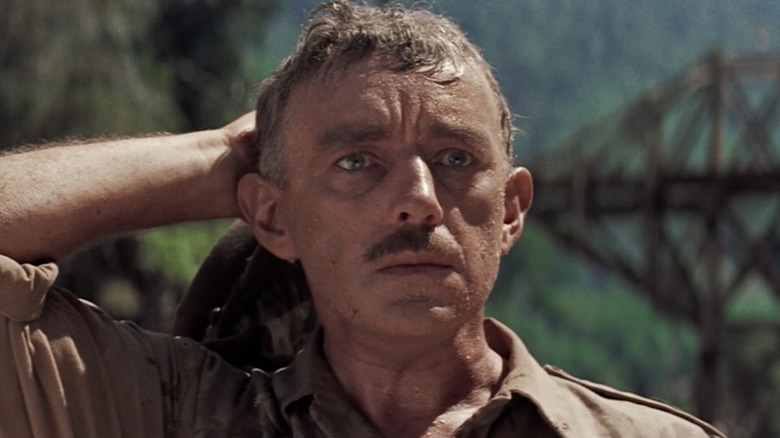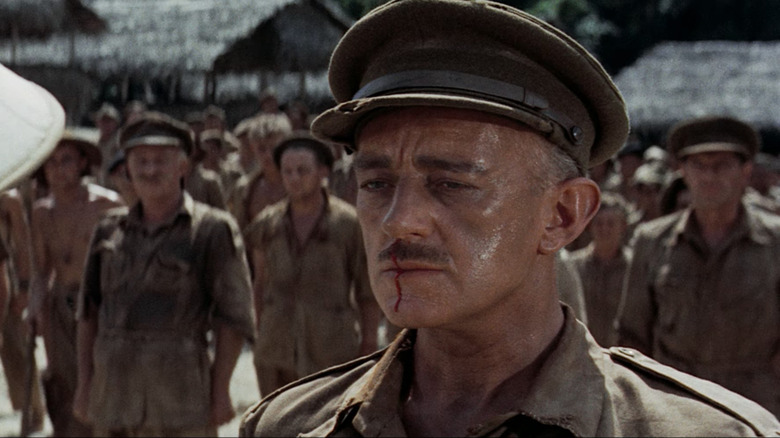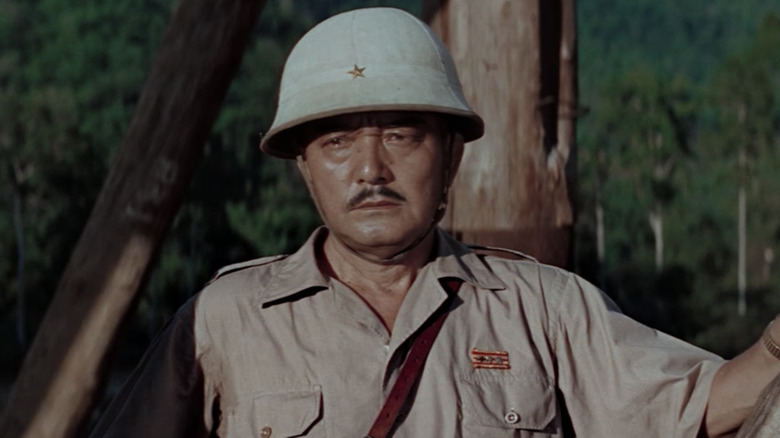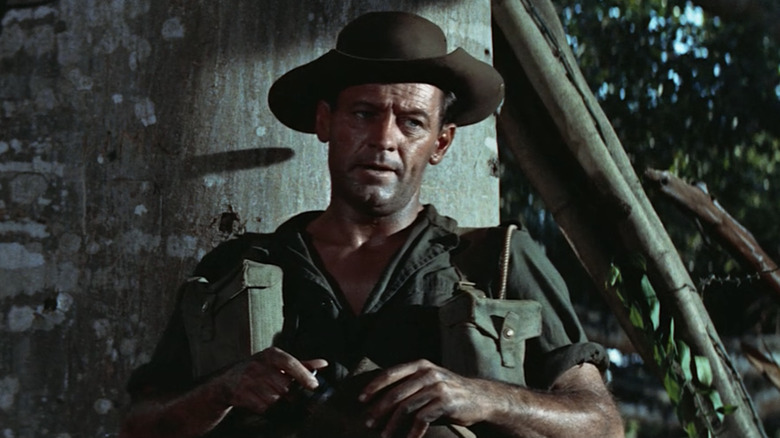The Bridge On The River Kwai Ending Explained: When Duty Becomes Hubris
When it comes to film, no one has ever understood the word "epic" quite as much as David Lean. The British director captured scale in ways that completely baffle the mind. Sure, there are the gorgeous landscapes and huge masses of extras, but also he frames a simple medium shot in a way that makes it feel like the grandest thing you have ever seen. In the best of his epics, he focuses on characters whose inner turmoil match the physical scale of the production. Of course, his 1962 masterpiece "Lawrence of Arabia" is the greatest crystallization of this concept, but not too far behind it is Lean's first true-blue epic, 1957's "The Bridge on the River Kwai."
This film about a British battalion in a Japanese prisoner of war camp in Thailand during World War II cleaned up at the Academy Awards, winning seven of the eight categories for which it was nominated. A rather stunning win percentage there, especially considering it was going up against the likes of Sidney Lumet's "12 Angry Men" and Billy Wilder's "Witness for the Prosecution." It didn't even get the most nominations that evening: that honor belonged to Joshua Logan's "Sayonara," another wartime movie set in East Asia, with 10 (winning four). Not only was "The Bridge on the River Kwai" an awards juggernaut, it also was the highest grossing film of 1957. No need for the Oscars to do a stupid Twitter poll that year.
"The Bridge on the River Kwai" set the stage for how Lean would approach the rest of his filmography, and with how grand the movie feels, it's pretty amazing Lean managed to find ways to go even bigger later in his career. But what makes this epic war film so impactful, more than anything, is the psychologies of its principal characters. These are men led by codes, honor, and duty, whose worlds come crumbling down over the course of the picture.
What have I done?
It is rather difficult to think of a more devastating four-word question than "What have I done?" — not only are these mournful, regretful words, but they typically come at a time after something terrible has happened. They are the words of someone seeing the error of their ways but being unable to course-correct in time. "What have I done?" is the final line spoken by Colonel Nicholson, played by Alec Guinness. He has been the head officer for this imprisoned battalion, driven entirely by his duties as a soldier for the crown and abiding by the proper rules of engagement in war. Nicholson does not want to admit it, but he is an exceptionally prideful man.
His men are tasked with building a bridge over the titular Kwai River, and the Japanese Colonel Saito (Sessue Hayakawa, who got an Oscar nomination for the role) insists the officers participate in the work, something that goes against the Geneva Convention. Nicholson is all too keen to point out this fact and is essentially kept in an isolation hot box for days on end. While the rest of the men initially are sabotaging their work to avoid helping the enemy, Saito strikes a deal with Nicholson and lets the British oversee the construction. Instead of following the motivation of his men, Nicholson wants to prove British excellence in constructing a perfect bridge, and he begins imposing all of the rules on his men he once decried Saito for implementing, often going further than he did.
What Nicholson doesn't know is there is a mission planned to destroy the bridge by the British Army, led by Major Warden (Jack Hawkins) and American navy man Shears (William Holden), who had escaped the prison and was presumed to be dead. When Nicholson sees the plan in action, with people all around him dying, and knowing how he actively tried to stop the demolition, all he can say is "What have I done?" before using his final moments to stumble and fall dead onto the detonator. This is a man who had no conception of his hubris, someone who wanted to prove he was a better man than those who opposed him. Guinness plays Nicholson with the stiffest upper lip you ever did see, and seeing this complete mental break when he utters those words makes that devastation even more palpable. Those four words have probably never been better utilized in film as they are here.
What makes a soldier?
A remarkable storytelling feat in "The Bridge on the River Kwai" is how it portrays who is ostensibly the antagonist of the film. When Sessue Hayakawa's Colonel Saito first shows up, you are filled with plenty of dread as a modern viewer, thinking about how potentially insensitive the Japanese character's portrayal will be in the 1957 British film. These fears are unfortunately met somewhat in the film, particularly in the women who assist with Major Warden and Shears' destruction plot, but for Colonel Saito, he is given a tremendous amount of depth rarely afforded to Japanese and other Asian characters at the time. The key to Saito's character is that he essentially has the reverse arc of Colonel Nicholson.
Saito begins the movie as the tyrannical taskmaster, where he literally slaps Nicholson across the face with a copy of the Geneva Convention. He has been the one tasked with making sure this bridge is built by a certain day, and under his strict command, everything is falling to pieces. If this bridge should fail, he is to commit ritual suicide. However, as Nicholson's influence and power in the prison camp increases, any shred of pride inside Saito starts leaving his body. By the end, he is a man who has been humbled, making his death somewhat tragic, given his personal development over the course of the film.
Throughout "The Bridge on the River Kwai," Saito speaks of soldiers' honor. When he first address the British soldiers, he refuses to call them soldiers, saying:
"Attention, English prisoners! Notice I do not say 'English soldiers.' From the moment you surrendered, you ceased to be soldiers. You will finish the bridge by the twelfth day of May. You will work under the direction of a Japanese engineer, Lieutenant Miura. Time is short. All men will work. Your officers will work beside you. This is only just. For it is they who betray you by surrender. Your shame is their dishonor. It is they who told you, 'Better to live like a coolie than die like a hero.' It is they who brought you here, not I. Therefore, they will join you in useful labor."
Relinquishing control of the bridge to Nicholson later in the film goes squarely against that mentality, but it is only through that action can he begin to see the humanity and value of others as people. "Be happy in your work," is Saito's motto, but he does not abide by this himself, not until it is too late. One cannot be happy in their work or their life until they know humanity. Sessue Hayakawa's performance as Saito beautifully brings all of these insecurities to his performance, and he was rightly nominated for it. Too bad he didn't win — if he had, then both Best Supporting Actor and Actress would have gone to Japanese actors (with Miyoshi Umeki winning for Best Supporting Actress for "Sayonara").
Cut to the movie star
William Holden is first billed in "The Bridge on the River Kwai," as he was a massive star at the time, but his whole side of the story somehow feels disconnected from the rest of the picture. His conflict about being a man impersonating an officer for preferential treatment does not psychologically weigh on him, the quest to go back to the camp drags, and there are too many scenes of women making eyes at him. Everything happening at that prison camp plumbs the depths of the character's psychologies, and every so often we are interrupted by a swaggering American coming in. It's the one time David Lean's desire for scope hurts him a bit.
This is why Lean's later project "Lawrence of Arabia" is a better remembered film than "The Bridge on the River Kwai." For as enormous and sweeping as the 1962 film gets, it is always squarely focused on Peter O'Toole's complex protagonist T.E. Lawrence. When we are with Alec Guinness and Sessue Hayakawa at the prison in "The Bridge on the River Kwai," we are doing exactly that, and it is absolutely riveting — but cutting to the big movie star puts a damper on it. When the two storylines converge in the ending, all the emotion we feel is coming from Alec Guinness' gobsmacking performance. Seeing William Holden die only works as much as Guinness makes you feel it.
Don't get me wrong — "The Bridge on the River Kwai" is a terrific picture, even if it's not the best of Lean's work. That ending, complete with the awe-inspiring practical destruction of this bridge, still gets you in your gut. The final lines, "Madness! Madness!" — spoken by James Donald's Major Clipton — are a perfect capper as well. It is definitely one of those movies that makes you say, "Well, they don't make them like this anymore," and we are lesser because of it.



